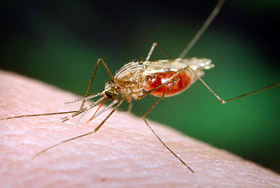Beat Bugs Without DEET: U.S. Boosts 2 Alternatives
Summertime … swat … and the living is … swat … swat … swat—nothing ruins a summer day like a swarm of bloodthirsty mosquitoes.
For years the only scientifically proven way to ward off the buggers was to use an insect repellent containing the chemical compound DEET (diethyl toluamide).
But the pesticide has long been equally effective at repelling some consumers with its strong smell, its greasy feel, and its possible side effects.
Now, just in time for summer, the U.S. government has given its stamp of approval to two alternatives to DEET: picaridin and oil of lemon eucalyptus. The Centers for Disease Control and Prevention (CDC) announced their recommendation of the alternatives this April.
Picaridin (KBR 3023) is found in many mosquito repellents used for years in Europe, Australia, Latin America, and Asia. It is now sold in the U.S. under the Cutter Advanced brand name.
Oil of lemon eucalyptus (p-menthane 3,8-diol or PMD) is the only plant-based active ingredient for insect repellents approved by the CDC. It is derived from eucalyptus leaves and is found in a variety of repellents throughout the U.S., according to the CDC.
"We still recommend DEET for someone who is traveling internationally, because it does have the most impressive record of safety and protection," said Jennifer Morcone, a spokesperson for the Atlanta-based CDC.
All of the repellents, Morcone added, work by creating a barrier on the skin that confuses mosquitoes and keeps them at bay. Proper application according to the label is essential for safe and effective protection.
Infection Protection
The CDC's approval of picaridin and oil of lemon eucalyptus comes as West Nile virus, a potentially deadly infectious disease spread by mosquitoes, is beginning its annual upswing across North America.
Most people who contract the virus show no symptoms, but about 20 percent experience headaches, fevers, and nausea. About 1 in 150 people fall seriously ill with symptoms that can lead to vision loss, paralysis, and death.
According to Morcone, the CDC hopes its approval of picaridin and oil of lemon eucalyptus will encourage more people to protect themselves against West Nile virus.
MOST POPULAR STORIES
Photo in the News: Oldest Known Maya Mural Reveals Royal TaleArchaeologists have revealed the final wall of the earliest known Maya mural, sa... |
Oldest Known Maya Mural, Tomb Reveal Story of Ancient KingArchaeologists have revealed the final wall of the earliest known Maya mural, sa... |
King Kong Island Home Is Pure Fantasy, Ecology Experts SaySkull Island, the mythical home of the great ape King Kong, is supposed to lie i... |
|
||||||||||









